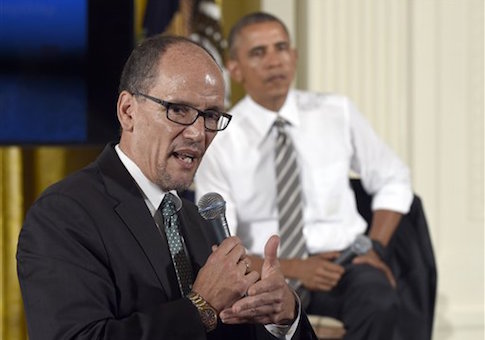A federal judge appointed by Barack Obama struck down one of the president's signature labor regulations on Tuesday just days before it was to go into effect.
Texas District Court Judge Amos L. Mazzant granted a preliminary injunction on the department's new overtime regulations, which would have forced employers to pay overtime to any white collar employee making less than $913 a week—double the previous threshold of $455. Mazzant's temporary injunction will prevent the rules from taking effect on Dec. 1.
"Congress intended the EAP [executive, administrative, or professional] exemption to depend on an employee’s duties rather than an employee’s salary," Mazzant said in the ruling.
President Obama called for new overtime regulations in a 2014 executive order. The department announced its final rules in May in a press conference attended by Obama and Labor Secretary Tom Perez.
The overtime rules not only doubled the pay level, but also put into place a pay-scale escalator that would have automatically raised the threshold every three years. It was one of the Obama administration's most wide-reaching regulations and was expected to affect 4 million workers.
The law met resistance from state and local governments, as well as numerous industry trade groups. More than 20 states sued the department, arguing that the new rules violated the 10th Amendment by infringing on a state government's right to set pay levels and that the regulations did not abide by the law as it was written by legislators.
Judge Mazzant, who Obama appointed to Eastern District of Texas court in 2014, agreed with the plaintiffs that regulators stepped beyond the scope of the Fair Labor Standards Act.
"Nothing in the EAP exemption indicates that Congress intended the Department to define and delimit with respect to a minimum salary level," he ruled.
A department spokesman said in a release that it is exploring its legal options, which could include filing an emergency appeal to the Fifth Circuit Court of Appeals. It defended the rulemaking process, which included a public comment period that drew nearly 300,000 submissions from industry, labor, and public policy groups.
"We strongly disagree with the decision by the court, which has the effect of delaying a fair day’s pay for a long day’s work for millions of hardworking Americans," the department said in a release. "The department’s overtime rule is the result of a comprehensive, inclusive rulemaking process, and we remain confident in the legality of all aspects of the rule."
Nevada Attorney General Adam Laxalt applauded the ruling.
"Federal agencies cannot unilaterally reinterpret federal law to impose burdens on state governments and businesses, and today's preliminary injunction reinforces the importance of rule of law and constitutional government," Laxalt said in a release. "This latest example of federal overreach would have imposed millions of dollars of unfunded liabilities on the States, a loss of private sector jobs, huge financial and regulatory burdens on small businesses, and undoubtedly caused great difficulty across the country ... Businesses and state and local governments across the country can breathe a sign of relief now that this rule has been halted."
The National Retail Federation, which joined in the suit to block the new regulations, said the injunction would grant employers a reprieve from the department's "reckless and aggressive overreach."
"The Labor Department’s overtime changes are a reckless and aggressive overreach of executive power, and retailers are pleased with the judge’s decision," NRF spokesman David French said in a release. "The rules are just plain bad public policy, and we are pleased that the judge is allowing time for the case to go forward before they can go into effect."
Some activist groups criticized the ruling, saying it would hurt workers. The National Partnership for Women & Families called the injunction an "appalling overreach" in a statement. The group's president, Debra Ness, said the existing $455 threshold demonstrates that the department is within its right to take wage levels into consideration when setting overtime rules.
"The Texas court decision issued this evening is an appalling overreach that must not stand," Ness said. "The U.S. Department of Labor has set minimum salary requirements for overtime for more than 75 years, based on both an employee’s salary and duties, and it has the right to do so now."
Other trade groups welcomed the injunction. Robert Cresanti, president of the International Franchise Association, said in a release that the steep increase was too burdensome, adding that a "modest increase … would have been more appropriate."
"Today’s ruling is a serious and significant victory for the rule of law," he said. "Franchise owners who had been facing significant costs and questions about the impact the overtime rule was creating for compliance with an unreasonable new threshold and automatic increases."
It is the second major labor reform that has been put on hold in the past week. Another federal judge in Texas granted a permanent injunction against the department's Persuader rule, which would have forced companies to disclose any outside counsel or consultants they meet with during a union organizing campaign.
The previous regulations held that disclosure was only required if those consultants or lawyers interacted with employees; the department sought to extend that to even private meetings with management. On Nov. 16, federal Judge Samuel Cummings said that those regulations "should be held unlawful and set aside."
The preliminary injunction will remain in place while the court assesses the legality of the rule.
Update 11:53 A.M.: This post has been updated to reflect comment from Nevada Attorney General Adam Laxalt.
